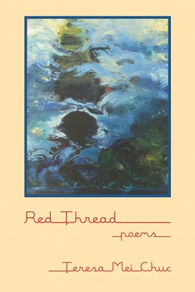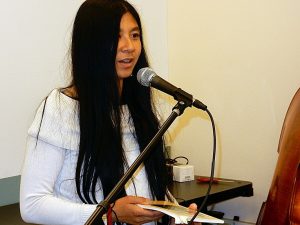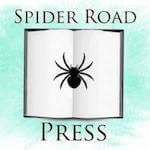Being Asian American and Pacific Islander Heritage Month, Teresa Mei Chuc was the perfect Spider Road Press contributing writer to interview for our May post. Since publishing her piece “Cam On” in our poetry collection In the Questions, back in 2015, we’ve loved getting to know her work and watching her bring more incredible poetry into the world. We think you’ll enjoy reading our recent conversation with her as much as we enjoyed having it.
***
Spider Road Press: Your autobiographical poetry collection, Red Thread, focuses on your family and the journey you took to relocate from Vietnam to America. How did you know you were ready to write, and share with the world, these emotionally raw and often heart-wrenching pieces, back in 2012?
Teresa Mei Chuc: My family was fractured due to the American war in Vietnam. My father spent nine years in a Vietcong reeducation camp and suffered from PTSD when he was united with his family in the United States. Since my mother was pregnant with me when he had to report to reeducation, the first time I saw my father was when I was nine years old and he was released.
The trauma that my parents and grandparents experienced through the war was passed down to my generation. Trauma from the consequences of war is intergenerational and the effects could be felt through many generations. I felt that I needed to record and document my family’s stories and the story of the American war in Vietnam as experienced by a Vietnamese refugee.
My family’s story is the story of many Vietnamese refugees. Writing Red Thread was part of my healing process to understand the violence that I grew up with and to understand the struggle that my family went through. It was my healing to humanize us and others that were de-humanized through war and its aftermath. I think there was the need to find the ability to love myself which was difficult because I grew up with a history of war and violence and the feeling that I was not worthy of love.
It was by dissecting and delving into my family history and the history of the American war in Vietnam that I began to understand the impact that the United States of America’s imperialism and colonialism had on my life and my family’s life. Through writing, I began the journey of discovering myself, empowering myself and breaking the cycle of violence.
SRP: Your writings are enmeshed with the themes of family, survival, and identity. What drew you to write about these subjects and do you think you’ve completed your journey with these motifs or is there more to say?
TMC: I think that the themes family, survival and identity are interconnected. A large part of my parents’ lives was about surviving the war and the aftermath of war. My paternal grandmother was part of helping the family survive while her son, my father, was in prison.
I grew up in a matriarchy and that is part of my culture. My grandmother was the most respected and powerful person in the family because she was an elder and eldest woman in the family. However, my father’s PTSD due to the war had an adverse effect on the matriarchy in the family. Violence and aggression became a norm.
Because of family, my cultural identity and my personal identity connected with my native culture was able to survive even as I was navigating American culture. I think family, survival and identity will continue to be themes interwoven in my writings even if I am writing on different subject matters.
SRP: Could you tell us a bit about how writing such a powerful and personal book, as Red Thread, changed you and/or your life?
TMC: Writing Red Thread changed my life because I am able to tell my story, my family’s story and the stories of the American war in Vietnam through poetry. I am able to raise awareness about the American war in Vietnam, other wars, and the consequences of war. It is healing when people listen to my poetry.
I think it is also empowering that I am giving voice and standing up for the voiceless through my poetry. Growing up, I was very shy and struggled with my sense of self-worth due to the effects of war, domestic violence and trauma. I was able to gain courage through my poetry, to “speak,” and to be a part of breaking the cycle of violence. I am a strong advocate for peace.
SRP: There are too many amazing feats you’ve accomplished over the past decade to mention them all, but one that we really want to highlight—from one small press to another—is Shabda Press. You’ve helped promote so many incredible writers through this labor of literary love. Is there anything you’d like to share with our readers, many of whom are writers, about your experience in the world of publishing?
 TMC: Publishing is very rewarding though a lot of work. It is a labor of love. It is a joy to work with authors to create books and share their poetry with the world. The most recent collection that Shabda Press has published is Nuclear Impact: Broken Atoms in Our Hands. There are readings for the anthology around the country. I am grateful that I could help bring awareness about the impact of nuclear power and energy on the planet.
TMC: Publishing is very rewarding though a lot of work. It is a labor of love. It is a joy to work with authors to create books and share their poetry with the world. The most recent collection that Shabda Press has published is Nuclear Impact: Broken Atoms in Our Hands. There are readings for the anthology around the country. I am grateful that I could help bring awareness about the impact of nuclear power and energy on the planet.
http://www.shabdapress.com/nuclear-impact-broken-atoms-in-our-hands-readingsevents.html
I think it’s important to become involved with the publishing process in other ways in addition to being a writer, as an editor, book reviewer, or publisher. It’s great to contribute to the poetry community and support each other as writers.
SRP: Back to your writing, Invisible Light is scheduled to release this year. Are there any details that you can and want to share with us about this project?
TMC: Invisible Light is very much a book of poetry in progress and is quite different from my previous books in terms of subject matter with a strong focus on the environment and endangered animals and plants. The oppression of colonialism and imperialism continue to appear in my poetry as it permeates so many areas of our lives.
SRP: One lighter question before we wrap up. In your piece “Cam On” from In The Questions, you wrote about wanting to learn many languages including the language of your heritage, Vietnamese. Not to put you on the spot, but how’s it going? Any successes, regrets, or lingering desires around learning and exploring new languages?
TMC: I have a deep passion for languages and always love learning new languages. Two summers ago, I visited Vietnam and so I studied Vietnamese to prepare for my trip. I love practicing speaking and reading the language and it was wonderful to be able to communicate in Vietnamese when I was in Vietnam. I was happy to learn my native language. I love learning languages and continue to learn new languages. Each new language I learn opens the door to a new world. Another language I am fluent in is Russian. I enjoy being able to read poems by my favorite poets, Marina Tsvetaeva and Anna Akhmatova, in the language. It is beautiful.
SRP: Could you share with us the names of a few more fellow, female-identifying poets whose work you admire and you would recommend to readers?
TMC: Some female or queer-identifying poets whose work I admire are Chumash/Esselen poet and writer Deborah A. Miranda, Tiana Clark, Marina Tsvetaeva, Anna Akhmatova, Brigit Pegeen Kelly and Sandra Cisneros.
SRP: Last question. For the young and emerging writers in the world, could you offer a pearl of advice or wisdom that you’ve learned along your journey that might help them?
TMC: Believe in yourself, never give up and be patient with your work. “Everything is gestation and then birthing.” – Rainer Maria Rilke
***
For SRP, I’m Jody T. Morse. A huge thank you to Teresa Mei Chuc for taking the time to speak with us, our faithful readership for sticking with us, and everyone out there that supports small presses and their writers. To learn more about Spider Road Press and the books in our catalog, visit www.spiderroadpress.com.
